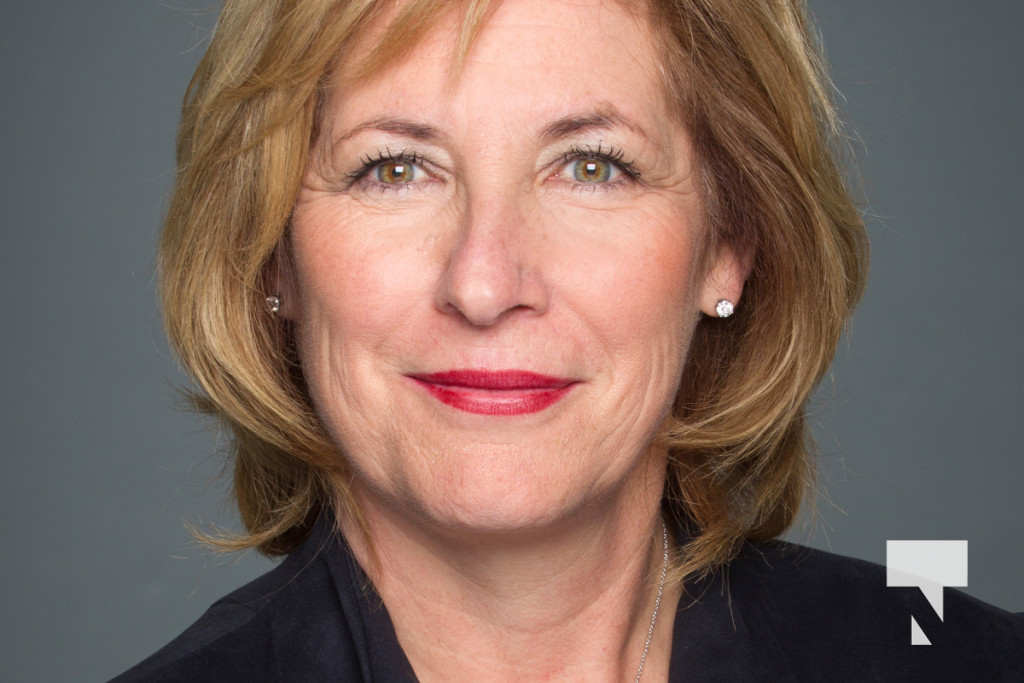Cecilia Nasmith/Today’s Northumberland
The pride Northumberland-Peterborough South MP Kim Rudd takes in the recent Federal budget is more than that of a party member.
In fact, Rudd told a group of Port Hope and District Chamber of Commerce members who gathered Friday at Town Hall, the membership she recently was given on the finance committee meant she was personally involved.
“When we are doing budget consultations, we meet up to 25 hours a week with people coming in, giving presentations, groups, individuals,” she said.
“We did some travelling too – Whitehorse, Victoria, Edmonton and Winnipeg in four days. That’s important – not everybody can come to us. People had to really tell us what life was like for them.
“There were actually 530 witnesses and additional presentations. It’s our job to let them all understand, go back, ask questions, bring in officials from departments to say, ‘If we do this, what does that look like’ – because everything has a consequence.
“We made 99 recommendations from the finance committee, and it looks like we got almost 70%. That tells me we have done our work. What did we get that I am pleased about? Almost everything.”
Out of the voluminous budget document, she shared some highlights that are especially welcome in the Northumberland-Peterborough South riding, such as the $6-billion commitment to rural broadband that will see reliable, usable high-speed internet available to 95% of Canadian homes and businesses by 2026 (and 100% of them by 2030).
“This has been a huge issue,” she said. Not only does it affect businesses and personal lives, but even children – with so many schools going electronic, she has heard of children unable to do their homework.
“There’s a big Eastern Ontario Regional Network project coming out, and we are hoping the province can push it through because, when they do, that’s where we come in.”
Rudd also reported that Telus has committed to reinvesting every cent they realize from the Federal Accelerated Capital Cost Allowance back into rural broadband, joining Bell and Rogers in that commitment. This could potentially leverage that $6-billion into $18-billion, she said.
A one-time municipal infrastructure top-up fund of $2.2-billion through the Federal Gas Tax Fund will double the work municipalities can undertake in 2018-2019.
This is one of the few mechanisms the Federal government has to provide money directly to municipalities, Rudd added, explaining how the process works. Provinces identify their funding priorities, and municipalities apply for project funding from the province. Submitting the application is their commitment to fund one-third the cost. If the province agrees an application is consistent with its priorities, they send it away to the Federal government – doing so commits the province to its one-third of the cost. If the Federal government approves, that’s the final one-third.
“In our province, water and wastewater are the number-one ask we get,” Rudd said.
“For some communities, it’s infrastructure, and a very small amount for roads and bridges – which is an Ontario priority.”
The New Horizons Fund for seniors will get an additional $100-million over five years, and a flow of $20-million thereafter, she said. This funding can be used many different ways with the aim of keeping seniors more independent and healthy (an especial concern in rural areas and during winter weather). In Trent Hills, for example, they offer seniors art and quilting classes.
Though questions remain around the implementation, Rudd is proud of ways homeownership is becoming more affordable for first-time buyers.
Canada Mortgage and Housing Corporation will pitch in up to 10% of the cost of a new home (or up to 5% of the cost of a resale home) as its ownership stake in the property, refundable when the house is sold. As this counts toward the down payment, it lowers the mortgage amount, potentially saving a family up to $270 a month.
It’s not being done to raise money for the CMHC, Rudd pointed out. The 5% repaid when the house is sold remains 5%, even if the house has depreciated in value.
A national pharmacare plan is closer to fruition, with the creation of a new Canadian Drug Agency. Rudd reports that there’s strong support from generic-drug agencies, but so often drugs for catastrophic conditions are only available through large name-brand companies.
Seniors want to work longer, she has found. And for those who rely on Canada Pension Plan, Old Age Security and the Guaranteed Income Supplement, they can do so more profitably now with an enhanced earning exemption for the GAINS that lets them keep more of what they earn.
In her own career, as owner of Willis College, Rudd dealt with many people who lost their jobs and had to retrain. The new Canada Training Benefit will make that easier,
“We are statistically one of the best-educated countries in the world – we we have to make sure we’re the best-trained,” she said.
This can be a barrier, both for the person who needs to learn new skills and for employers who want their employees to upgrade, The new $5,000 lifetime maximum allowance is now in place for this purpose, and these trainees may even qualify for unemployment benefits while they learn. And this applies to any kind of education, even if it’s college or university.
It’s figuring into discussions that are going on right now for some former GM employees, she said, as they work to transition into jobs at Ontario Power Generation – sometimes the new skill set they need may not be so great.
There is now a lowered interest rate on Canada Student Loans, she said, which carry an interest-free six-month grace period after the student leaves school.
Rudd urged Canadians to investigate the new energy-efficiency bonus. For example, on electric or hydrogen-cell vehicles that cost under $45,000, you could get up to $5,000.
Instead of providing employment to students returning to school, changes to the Canada Summer Jobs Program mean it is open to young people aged 15 to 30, whether or not they will be returning to school. This means new graduates unable as yet to find that first job may be able to take advantage of this option.
This is an important program, communications director Jamie Simmons said, because so often a young worker taken on for the summer manages to prove him- or herself with flying colours and eventually get taken on full-time.
Simmons had more good news to share about their Canada Summer Jobs program. It had grown from $247,000 before they took office to $667,000 in 2016. It had fluctuated in intervening years, but he was hoping to get $650,000 for the program for 2019. Then he got the news that it would be $750,000 – but when the announcement actually came, it was $987,000. This will means that not only will more students are hired, but also that businesses that might otherwise not have qualified for the program may now be able to participate.
One of the chamber members present asked what all this does to the deficit, but Rudd is optimistic.
In fact, she said, even with a $3-billion cushion built in, the budget came in $2-billion less than they had predicted. The revenue now coming into the government now is outpacing spending, holding down the deficit.
“We have the lowest debt-to-GDP in the G7,” she said.
“Unemployment is the lowest in four years, and 900,000 jobs have been created by Canadians in the last few years. These are stability factors that help cushion the effects if there is a downturn.
“The Canadian Child Benefit adds almost $600,000 to our riding in a month. Statistically, it’s being spent in our riding. That ripple effect helps fuel the economy.”
Economists are predicting a downtown for early 2019, she allowed, but it will be followed by a slow-paced pick-up.
She is also excited by the continuing good work being done across the region by the Northumberland Community Futures Development Corporation, sharing some recent statistics – creating 1,070 jobs through its various programming (and maintaining another 2,350-plus jobs), forging more than 470 new partnerships, being involved in $25.2-million worth of corporate investment, investing more than $56-million over five years that resulted in a GDP lift of $25.2-million,
Mayor Bob Sanderson thanked Rudd for bringing good new to the riding.
“From everything we can see,this budget aligns very well with the priorities of this community,” Sanderson stated.
“These are investments, not hand-outs. We want to be as sustainable as we can, and I think we are really on that road. And from a chamber perspective, if we can improve that collaborative perspective, that’s one of our goals going forward.”























